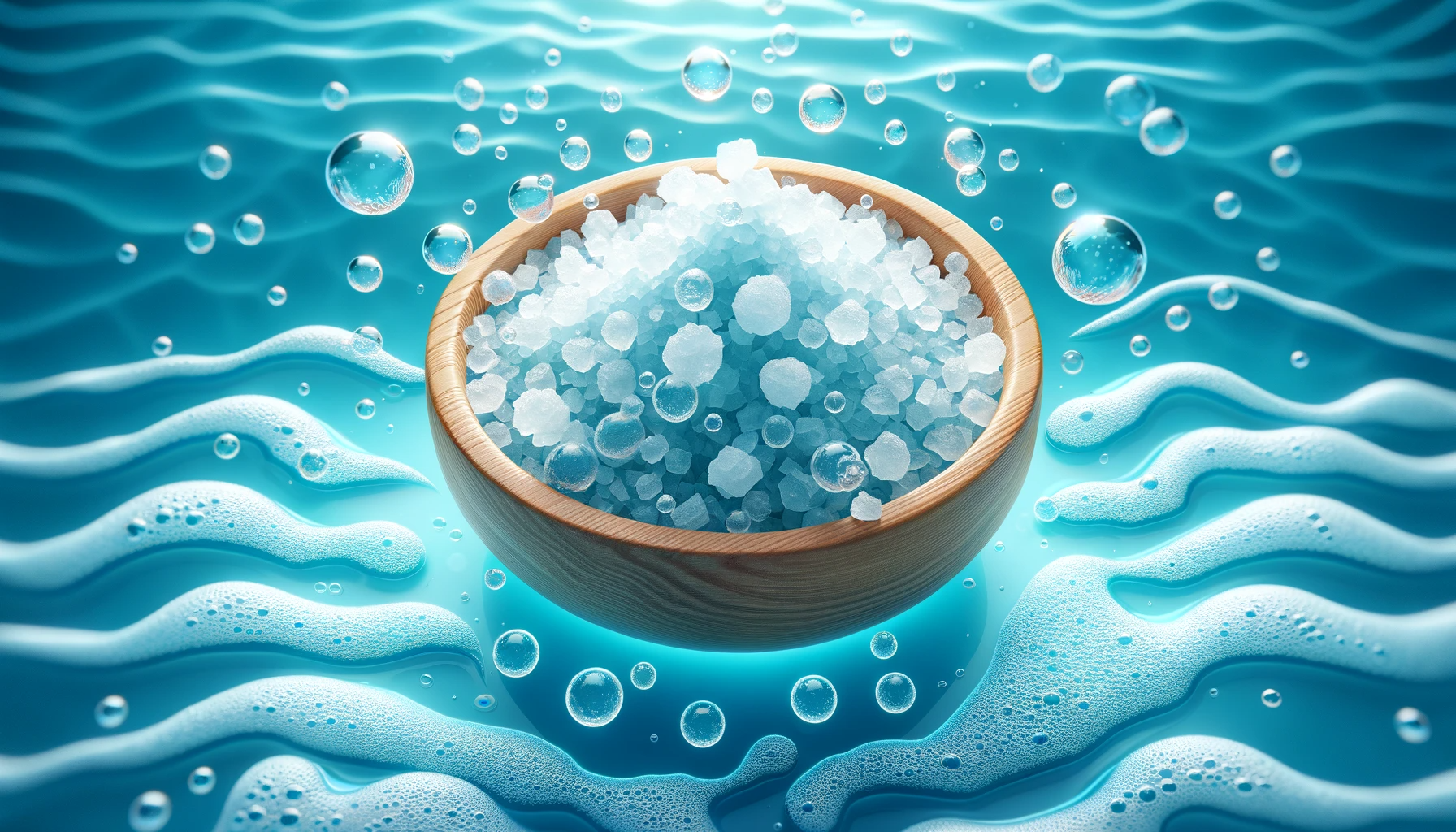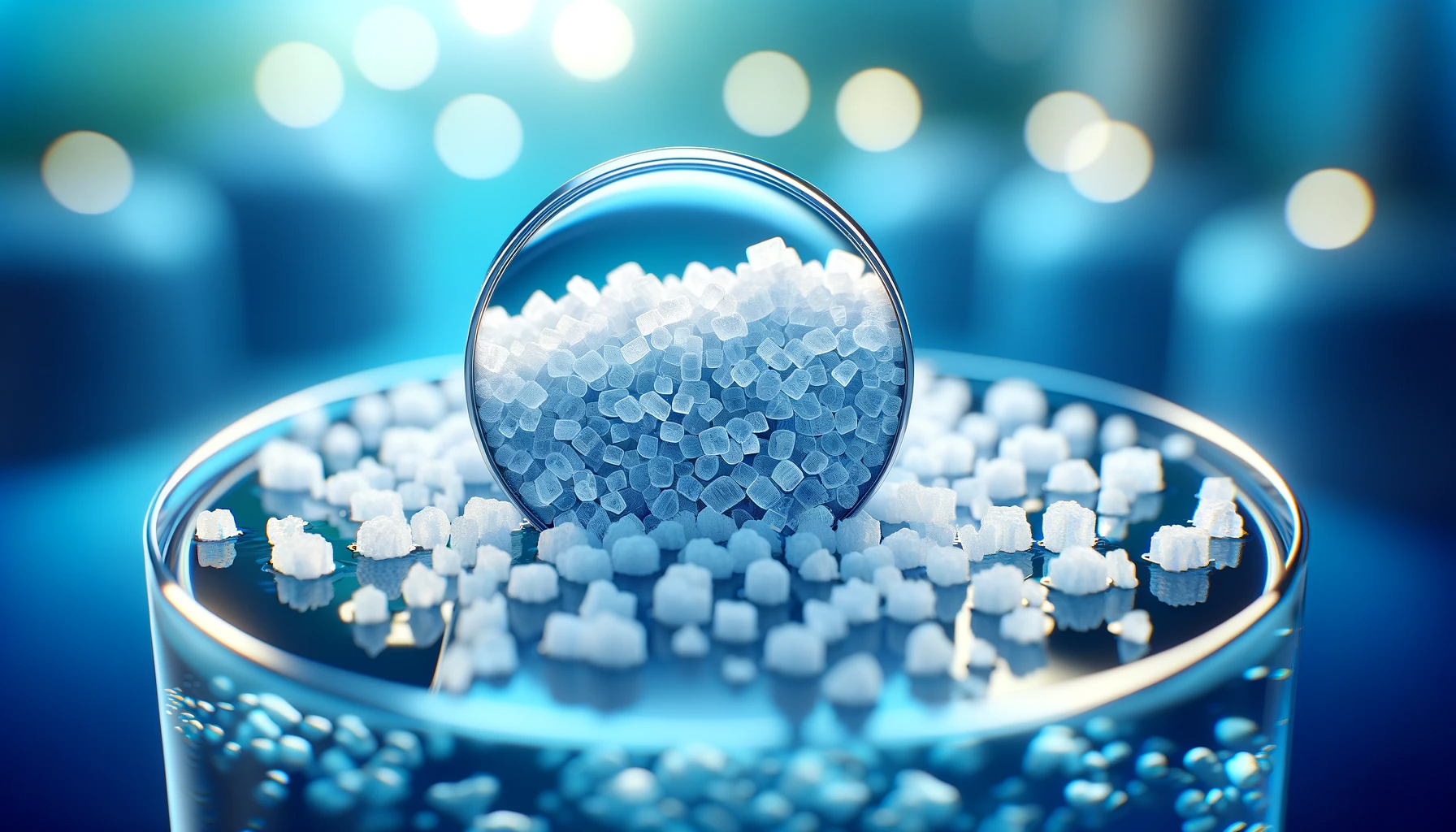Water softener salt and pool salt are not the same, although they both serve to alter water chemistry. Pool salt is specifically formulated for use in pool chlorinators, while water softener salt is designed to remove hard water minerals.
Understanding the differences between water softener salt and pool salt is essential for maintaining home water systems and pools effectively. Each type of salt plays a crucial role in its respective environment. Water softener salt typically comes in the form of pellets or crystals and works to replace hard minerals like calcium and magnesium with sodium ions.
This process softens water, preventing scale buildup in plumbing and improving soap efficiency. On the other hand, pool salt is often more refined and is used to generate chlorine through electrolysis in saltwater pools, thereby disinfecting the water. Homeowners and pool owners should ensure that they use the correct type of salt to avoid damage to their equipment and ensure optimal performance.
Understanding Water Softener Salt
Maintaining a clean and healthy water supply is crucial at home. Water softener salt plays a pivotal role in ensuring that your water is free of certain minerals. Let’s dive deeper into what water softener salt is, how it functions, and the different types available.
What Is Water Softener Salt?
Water softener salt is a specific type of salt used in water softeners to remove minerals from hard water. These minerals include calcium and magnesium, which can cause limescale buildup in pipes and appliances.
How Does Water Softener Salt Work?
In the water softening process, salt crystals regenerate ion exchange resins. By replacing hard minerals with sodium ions, the water becomes “soft.” The process is not only efficient but also prolongs appliance lifespans and improves water quality.
Types Of Water Softener Salt
There are several types of water softener salt. Here’s a quick list:
- Solar salt – Harvested through evaporation of seawater.
- Evaporated salt – Obtained by mining underground salt deposits.
- Rock salt – Mined from mineral deposits, containing more insoluble materials.
- Block salt – Molded salt blocks, suitable for specific softener models.
Each type of salt comes in various forms like pellets, crystals, and blocks, each designed for specific water softener models and user preferences.
Understanding Pool Salt
Many pool owners ponder whether the salt used in their pools is unique. Understanding pool salt is key to maintaining a healthy, swimmable pool. Here is a simple guide.

What Is Pool Salt?
Pool salt is a refined form of salt. It dissolves quickly in pool water. It works with saltwater chlorinators to keep pools clean.
How Does Pool Salt Work?
When pool salt dissolves, it partners with a pool’s chlorine generator. This machine turns salt into chlorine, which cleans the water.
Types Of Pool Salt
Different types of pool salt exist:
- Solar Salt – harvested from seawater.
- Mechanically Evaporated Salt – from salt brine.
- Mined Salt – from underground salt deposits.
Each type has its benefits and uses in keeping your pool in top shape.
Differences Between Water Softener Salt And Pool Salt
Understanding the ‘Differences Between Water Softener Salt and Pool Salt’ is crucial. Many ask, “is pool salt the same as water softener salt?” Although similar in appearance, these salts serve distinct purposes, and understanding their differences is essential for proper pool and water softening system maintenance.
Chemical Composition
The chemical makeup of water softener salt and pool salt differs. While both usually come from sodium chloride, the purity level sets them apart. Water softener salt often contains added substances like resin cleaners to enhance water softening systems.
In contrast, pool salt generally boasts a higher purity level. This purity is essential since it minimizes the risk of pool system damage and prevents unwanted residue.
Purpose Of Use
Water softener salt replaces hard minerals in household water. This creates softer water that’s gentle on the skin and appliances. Pool salt, on the other hand, is for saltwater pools. This salt interacts with chlorine generators to sanitize the water, keeping it clean and swim-ready.
Effects On Water Quality
These salts temporarily change water quality in distinct ways. Water softener salt makes hard water soft, improving soap lather and reducing scale buildup. In contrast, pool salt maintains swimming water quality. It helps generate chlorine, a sanitizer that keeps the pool water free of algae and bacteria.
Can Water Softener Salt Be Used As Pool Salt?
Pool owners often ask if they can use water softener salt in their pools. The simple answer is yes, you can use water softener salt as pool salt. This is due to both salts having the primary ingredient: sodium chloride. But you should understand the implications. Let’s dive into the pros and cons.
Advantages Of Using Water Softener Salt As Pool Salt
- Cost-effective: Water softener salt is cheaper than pool salt.
- Availability: It is easier to find in stores.
- Compatibility: It works well in saltwater chlorinator systems.
Disadvantages Of Using Water Softener Salt As Pool Salt
- Purity levels: Water softener salt may contain more impurities, which can cloud pool water.
- Added chemicals: Some types might have additives that are not ideal for pools.
- Dissolving rate: It can dissolve slower than pool salt, affecting pool maintenance.
Using Pool Salt In A Water Softener
Welcome to the discussion about Using Pool Salt in a Water Softener. Many homeowners wonder if the salt designated for pools can double as softener salt. Let’s dive into the specifics of whether pool salt can serve this dual purpose and the implications of using it in a water softening system.
Can Pool Salt Be Used In A Water Softener?
The short answer is yes. Pool salt and water softener salt share a key ingredient: sodium chloride. However, they are not identical. Pool salt is often less refined and may contain additional elements beneficial for pool chemistry. When using pool salt in a water softener, insightful consideration of its properties is essential.
Potential Issues When Using Pool Salt In A Water Softener
- Impurity Levels: Pool salt’s lower purity might lead to residue, clogging pipes and filters.
- Efficiency: May not dissolve as quickly, affecting the system’s effectiveness.
- System Damage: Possible damage to the water softener over time with non-designated salt types.
Alternatives For Water Softening In Pools
For optimal performance, consider alternatives specifically tailored for each application:
| Application | Salt Type |
|---|---|
| Water Softener System | Water Softener Salt |
| Pool Maintenance | Pool Salt |
By selecting the correct salt for each use, you ensure that both your water softener and pool stay clean, efficient, and long-lasting.

Precautions When Using Water Softener Salt As Pool Salt
When exploring the possibility of using water softener salt as pool salt, it is vital to exercise caution. Both may look similar, but differences in purity levels and additional additives can significantly impact pool maintenance and safety. In the following sections, we’ll delve into the key considerations and potential risks of substituting water softener salt for pool salt.
Considerations For Proper Use
Understanding the differences between pool salt and water softener salt is essential. Pool salt typically has higher purity levels, ensuring it dissolves quickly without leaving residue. Check your pool’s requirements and verify the salt type specified by the manufacturer.
- Inspect the salt for additives such as anti-caking agents, which might lead to pool damage or affect water clarity.
- Assess the salt’s purity level; it should be above 99.5% for pool use.
- Conduct regular salt and chemical levels testing to ensure proper pool conditions.
Potential Risks And Hazards
Using the wrong salt can cause a host of issues. Impurities can damage pool components, such as the chlorine generator, and affect water balance.
- Formation of scale on pool surfaces and filtration system leading to costly repairs.
- Unwanted chemicals may irritate skin and eyes or cause allergic reactions.
- Increased risk of equipment corrosion, shortening its lifespan.
| Factor | Pool Salt | Water Softener Salt |
|---|---|---|
| Purity Level | 99.9% | Varies |
| Additives | None | Anti-Caking Agents |
| Dissolution Rate | Fast | Slower |
Compatibility with your specific pool equipment also plays a crucial role. Always refer to the equipment manual before adding any salt. Follow proper dosing instructions to prevent any imbalance in the water chemistry.
While water softener salt may seem like a cost-effective substitute for pool salt, caution cannot be overstated. Avoid potential risks by adhering to manufacturer guidelines and regular maintenance of your pool’s salt and chemical balance.

Choosing The Right Salt For Your Needs
Choosing the right type of salt for specific uses is critical. Water softener salt and pool salt might appear similar, but they serve different purposes. Whether you want soft water at home or a pristine swimming pool, picking the right salt type ensures effectiveness and prolongs equipment life. This section will guide you through key factors for both.
Factors To Consider When Selecting Water Softener Salt
Water softener salt enhances home water systems.
- Purity Levels: High-purity salt prevents residue in water softeners.
- Form: Crystals, pellets, and blocks are common forms.
- Composition: Look for salt with minimal insoluble components.
- Price: Higher purity can mean higher costs but less maintenance.
- Health Concerns: Potassium chloride is an alternative for sodium issues.
Factors To Consider When Selecting Pool Salt
Pool salt maintains your swimming pool’s cleanliness.
- Purity: Ensures smooth operation of the chlorine generator.
- Quick Dissolving: Fine-grained salts dissolve faster.
- Non-iodized: Iodine can cause staining and pool issues.
- Type of Pool: Check salt compatibility with your pool’s system.
- Brand Reputation: Trusted brands often deliver consistent quality.
Alternatives To Pool Salt And Water Softener Salt
Exploring the realm of pool maintenance and water treatment, one might ponder if alternatives to standard pool and water softener salt exist. Indeed, various options are available, offering eco-friendly or chemical-free solutions. Let us delve into natural and innovative methods for keeping your water sparkling clean and soft.
Natural Alternatives For Water Softening
Traditional water softeners rely on salt to remove minerals that cause hardness. Yet, natural solutions can provide a similar effect without relying on these salts. Here are some alternatives:
- Magnetic Water Conditioners: These devices clip onto your water pipes, altering the electromagnetic properties of calcium and magnesium. These minerals then remain suspended in the water, reducing scale deposits.
- Chelation Systems: Chelation agents like NTA or EDTA bind with minerals in the water. This process makes minerals soluble and less apt to cause hardness.
- Electronic Water Descalers: Electronic descalers emit varying electromagnetic waves. These waves prevent minerals from crystallizing and sticking to surfaces.
Other Pool Sanitization Options
For those seeking alternatives to pool salt for sanitation, a variety of methods exist. Below are options that keep your pool clean:
| Sanitization Method | Description |
|---|---|
| Ozone Generators | Use powerful ozone gas to kill bacteria and oxidize contaminants. |
| UV Pool Systems | Employ ultraviolet light to destroy pathogens and reduce chemical use. |
| Mineral Cartridges | Release minerals like silver and copper with antibacterial properties. |
While exploring these alternatives, it’s imperative to consider the needs of your specific pool or water system and consult with a professional. Each option has its unique advantages, capable of providing an effective solution to traditional salts used in water softening and pool sanitation.
Cost Comparison
Understanding the costs tied to water softener and pool salt helps homeowners manage their budgets effectively. Let’s break down the expenses of both products and maintenance to make an informed decision.
Comparing The Cost Of Water Softener Salt And Pool Salt
Different uses mean different prices. Water softener salt is for home water systems. Pool salt is for swimming pools. Quality and purity affect their cost. Here’s a look at what you might pay.
| Type of Salt | Average Cost per 40lb Bag |
|---|---|
| Water Softener Salt | $5-$10 |
| Pool Salt | $6-$12 |
The table shows water softener salt is slightly less expensive than pool salt. Bulk purchases often lead to more savings.
Factoring Maintenance Expenses
Yet, initial costs are just part of the story. Maintenance costs matter too. Here are factors that affect ongoing expenses:
- The quality of salt can increase the lifespan of water softeners and pools
- Proper maintenance can decrease the need for repair costs
- The frequency of salt replacement can affect yearly expenses
For water softener systems, a higher purity salt could save money in the long run. For pools, regular cleaning minimizes salt use and protects equipment.
Environmental Impact
Understanding the ecological implications of our household choices is essential. It becomes even more crucial when considering products like water softeners and pool salts. These salts may seem harmless, but they carry potential environmental effects.
Environmental Considerations Of Water Softener Salt
Water softener salt works to exchange calcium and magnesium ions in hard water with sodium or potassium ions, resulting in soft water. However, the discharged water from water softening processes can lead to increased sodium levels in the environment. This high sodium concentration can affect soil structure, harming plant growth. It can also alter the mineral balance in local water supplies, affecting aquatic ecosystems.
The mining and transportation of water softener salt contribute to carbon emissions and landscape disruption. Choosing eco-friendly options, such as salts mined with minimal ecological impact, can help mitigate these concerns.
Environmental Considerations Of Pool Salt
Pool salt is used in saltwater pools to generate chlorine through electrolysis, keeping the pool free of pathogens. Unlike traditional chlorine treatments, which can leave harmful byproducts, pool salt itself has a lesser hazardous impact. nevertheless, it’s paramount to consider the source of the salt.
Over-accumulation of salt in waterways can harm ecosystems, and pool leakage can contribute to this. Systems should be properly maintained to prevent salt from seeping into the groundwater. Responsible sourcing and careful management of pool systems prove vital in diminishing the environmental toll.
| Aspect | Water Softener Salt | Pool Salt |
|---|---|---|
| Soil Health | Can degrade soil quality | Minimal direct effect |
| Water Impact | May increase local water salinity | Potentially affects water chemistry |
| Ecosystems | Could harm plant growth | May disrupt aquatic life balance |
| Sourcing | Extraction emits CO2 | Extraction methods vary |
Frequently Asked Questions For Is Water Softener Salt The Same As Pool Salt
Got questions about water softener salt and pool salt? You’re in the right place! Let’s dive into some common queries and clear up any confusion. Discover if these salts are interchangeable, what alternatives exist, and more!
Can I Use Water Softener Salt In My Pool?
Using water softener salt in your pool might seem like a handy solution, but proceed with caution. Water softener salt is typically much finer than pool salt, potentially leading to filtration issues in your pool’s system. Stick to salts designed for your pool to keep it running smoothly.
What happens if I use pool salt in my water softener?
What Happens If I Use Pool Salt In My Water Softener?
Curious about swapping in pool salt for your water softener’s needs? Pool salt may contain anti-caking agents or additional chemicals that could harm your softener. Using pool salt might lead to buildup and reduced efficiency of your water softening unit.
Are there any natural alternatives to water softener salt and pool salt?
Are There Any Natural Alternatives To Water Softener Salt And Pool Salt?
Seeking a green solution for your water woes? Natural options do exist. Consider magnesium chloride or potassium chloride as alternatives. These minerals can help to soften water or maintain your pool without relying on traditional sodium chloride salts.
What Is A Good Substitute For Pool Salt?
A good substitute for pool salt is solar salt or evaporated salt, both of which are readily available and cost-effective for pool maintenance.
Does It Matter What Kind Of Salt I Use In My Pool?
Yes, the type of salt used in your pool matters. Use only pure, non-iodized salt, specifically designed for saltwater pools, to ensure proper chlorine generation and maintain system efficiency.
Conclusion
Understanding the differences between water softener salt and pool salt is crucial for maintaining your systems effectively. Both types serve distinct purposes and should not be used interchangeably. By selecting the appropriate salt for your water softener or pool, you ensure longevity and performance.
Remember to choose wisely for optimal results and cost-efficiency in your home’s water management.


Leave a Reply